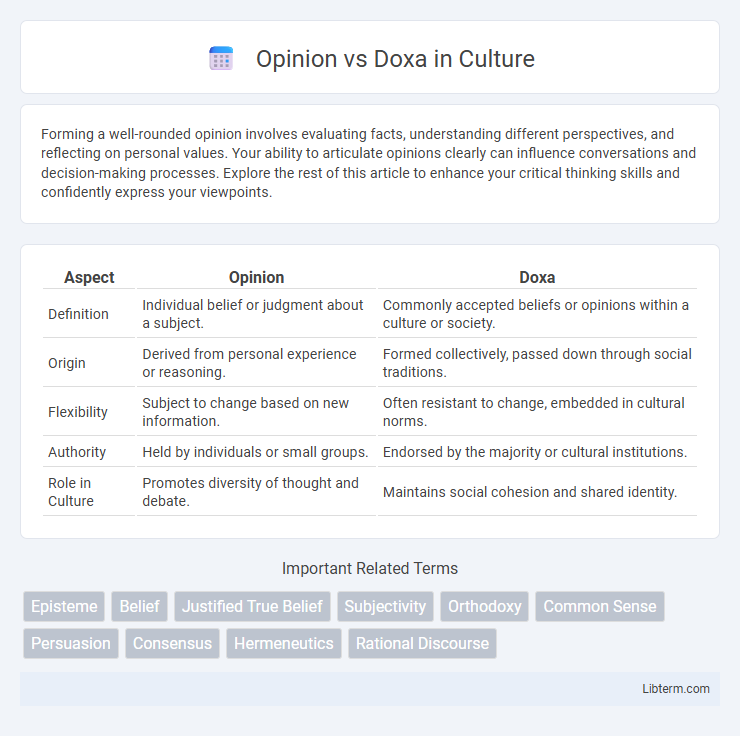Forming a well-rounded opinion involves evaluating facts, understanding different perspectives, and reflecting on personal values. Your ability to articulate opinions clearly can influence conversations and decision-making processes. Explore the rest of this article to enhance your critical thinking skills and confidently express your viewpoints.
Table of Comparison
| Aspect | Opinion | Doxa |
|---|---|---|
| Definition | Individual belief or judgment about a subject. | Commonly accepted beliefs or opinions within a culture or society. |
| Origin | Derived from personal experience or reasoning. | Formed collectively, passed down through social traditions. |
| Flexibility | Subject to change based on new information. | Often resistant to change, embedded in cultural norms. |
| Authority | Held by individuals or small groups. | Endorsed by the majority or cultural institutions. |
| Role in Culture | Promotes diversity of thought and debate. | Maintains social cohesion and shared identity. |
Understanding Opinion and Doxa: Definitions and Origins
Opinion, derived from the Latin "opinio," refers to a personal belief or judgment not necessarily based on fact or knowledge, while Doxa, rooted in ancient Greek philosophy, specifically denotes common belief or popular opinion within a society. The concept of Doxa originated with Plato and Aristotle, who contrasted it with Episteme, meaning true knowledge, highlighting the variability and subjectivity inherent in everyday beliefs. Understanding these terms involves recognizing Opinion as individual perspectives and Doxa as collective, socially accepted viewpoints shaped by cultural and historical contexts.
Historical Perspectives on Opinion and Doxa
Historical perspectives on opinion and doxa trace their roots to classical Greek philosophy, where doxa referred to common belief or popular opinion lacking philosophical certainty, as opposed to episteme, true knowledge. Plato critiqued doxa for its susceptibility to error, emphasizing reasoned knowledge over mere belief, while Aristotle acknowledged doxa as a necessary starting point for inquiry and practical decision-making. Over time, the distinction between opinion and doxa evolved, influencing epistemology and sociology by highlighting the tension between socially accepted norms and objective truth.
Opinion in Philosophy: From Plato to Modern Thinkers
Opinion in philosophy, distinguished from doxa, represents a subjective belief that lacks certain knowledge or justification. Plato critiqued opinion as a lower cognitive state compared to knowledge, emphasizing the need for reasoned understanding to achieve truth. Modern thinkers, such as Descartes and Kant, further developed the concept by exploring the limits and foundations of opinion in relation to certainty and scientific inquiry.
Doxa Explained: The Role of Common Belief
Doxa, as defined in classical philosophy, refers to common belief or popular opinion held by the majority without critical examination, shaping collective perceptions and social norms. Unlike opinion, which may be informed and reasoned, doxa operates on accepted truths that often go unquestioned, influencing cultural and ideological frameworks. This widespread acceptance of doxa plays a crucial role in maintaining social cohesion yet can also hinder intellectual progress by perpetuating misconceptions.
Key Differences Between Opinion and Doxa
Opinion represents an individual's personal belief or judgment based on limited evidence, often subjective and open to change. Doxa, originating from Greek philosophy, refers to common beliefs or societal consensus that are widely accepted without critical examination. The key difference lies in opinion being a private, potentially controversial stance, whereas doxa embodies collective, unchallenged perspectives shaping cultural norms.
The Influence of Society on Doxa Formation
Doxa represents the collective opinions and beliefs shaped by societal norms, traditions, and power structures, often accepted without critical examination. Social institutions, media, and cultural practices heavily influence the formation of doxa, reinforcing dominant ideologies and limiting individual autonomy in thought. Unlike personal opinions, which stem from individual reasoning, doxa reflects the pervasive impact of societal consensus on shaping what is perceived as truth.
Critical Thinking: Challenging Doxa and Opinion
Critical thinking rigorously examines opinion and doxa by questioning their validity and underlying assumptions, exposing biases and incomplete knowledge. It prioritizes evidence-based reasoning over mere acceptance of socially constructed beliefs or popular opinions. By challenging doxa, critical thinkers foster intellectual autonomy and deepen understanding beyond surface-level consensus.
Media, Misinformation, and the Shaping of Doxa
Media plays a critical role in shaping doxa by disseminating information that blurs the line between opinion and objective truth, often amplifying misinformation. Algorithms prioritize sensational or biased content, reinforcing collective beliefs without critical scrutiny, which solidifies doxa as unchallenged social consensus. Understanding the dynamics between media influence, misinformation, and public opinion is essential for evaluating how doxa forms and persists in contemporary society.
Opinion vs Doxa in Contemporary Discourse
Opinion in contemporary discourse is often characterized by personal beliefs supported by evidence, while doxa refers to widely accepted societal beliefs or common opinions without critical scrutiny. The clash between opinion and doxa highlights tensions between individual perspectives and collective norms, influencing public debates and media narratives. Understanding this distinction is crucial for navigating misinformation and fostering critical thinking in modern communication.
Towards Knowledge: Moving Beyond Opinion and Doxa
Moving beyond opinion and doxa requires a rigorous engagement with epistemological methods that prioritize evidence, critical analysis, and reasoned argumentation. Unlike doxa, which reflects commonly held beliefs without critical assessment, knowledge demands justification and truth-tracking criteria, positioning it as a more reliable cognitive state. Advancing from opinion and doxa towards knowledge involves systematic inquiry that challenges assumptions and validates claims through empirical or logical substantiation.
Opinion Infographic

 libterm.com
libterm.com